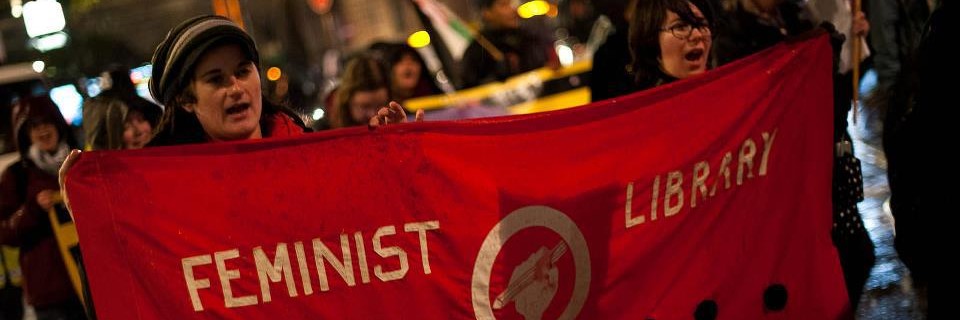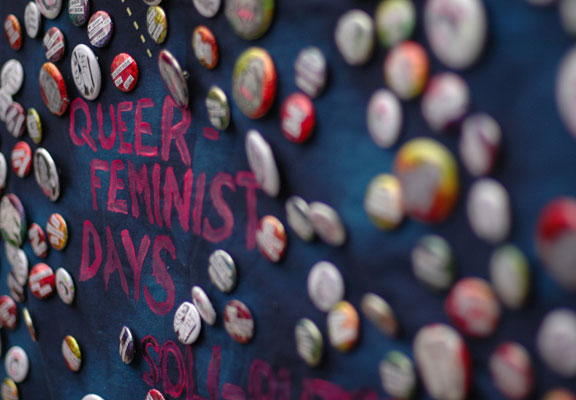activist training – Giving people concrete tools that they need in order to organize or protest. Before the anti-choice group Lambs of Christ invaded Fargo in 1991, for instance, staffers from the Fargo Women’s Health Clinic trained volunteer escorts in decoying (that is, pretending to be a woman coming into the clinic while the real patient was brought in through another entrance), nonviolent confrontation, and how
to avoid getting arrested.
agency – the capacity to act rationally (through the exercise of an individual or collectivized will, to externalize desires or to meet needs), especially with respect to self-definition or self-determination.
alienated labour – labour performed under capitalism and other systems of expropriation in
which workers do not have control over the conditions under which they labour, and in which the products of workers’ labour (material or immaterial) do not belong to them
binary thinking – a way of conceptualizing reality that divides it into two mutually exclusive sets of categories (“binaries”, “dualisms” or “dichotomies”), the terms of which are asymmetrically valued (e.g., white/black, reason/emotion).
blockade – a kind of direct action which physically cuts off access to a road or area, usually as an emergency measure. For example, the Six Nations blockade of spring/summer 2006 attempted to block a development on expropriated indigenous land, after the Canadian state refused to negotiate.
boycott – refusing to participate in, or support, a particular event, practice, or institution. For example, indigenous activists are currently organizing a boycott of the upcoming winter Olympics in Vancouver in order to draw attention to the ongoing condition of colonized aboriginal communities.
canvassing – going door-to-door providing information and raising awareness about an issue, or trying to get people to take action. For example, getting out the vote in communities with low voter turnout.
capitalism – an economic system based on the private ownership of the means of production. It is structurally characterized by the expropriation of the products of the labor of the working class (or, “proletariat”) by the capitalist or ruling class (or, “bourgeoisie”) in exchange for wages. The working class produces “surplus value” (profit) for the capitalist class – also known as “capital”. Capital has two tendencies: the tendency to expand into (or produce) new markets (through imperialism and colonization) and the tendency to concentrate in fewer and fewer hands. As a result of the latter, capitalism is typically characterized by an extreme disparity (or “gap”) between the rich and the poor.
civil disobedience -an umbrella term for nonviolent, socially disruptive actions which aim to transform institutions, social relations, or practices, and which reveal the repressive power of state violence. Mohandas Karamchand Gandhi and Martin Luther King Jr. are two well-known theorists and practitioners of civil disobedience.
class – the relation of a group of people to the means of production. In capitalist political economies, there are two classes: the proletariat, or working class, and the bourgeoisie, or capitalist class. The latter (bourgeoisie) owns the means of production whereas the former (proletariat) does not.
coalition – different groups coming together around a particular issue or with a particular purpose, while remaining independent.
commodification – the process through which in capitalist political economies, land, nonhuman animals, products of labor, ideas, and workers’ labour-power are assigned economic values (“exchange values”) and bought/sold on the market as commodities. Also sometimes used figuratively to refer to the encroachment of the market and capitalist values into non-economic relations or regions of life.
commodity – anything that is bought or sold (“exchanged”) in a capitalist political economy. The product of alienated labor performed under capitalism.
consciousness-raising (CR)- a method of building political solidarity between similarly situated individuals and of generating oppositional knowledge, through the sharing of experiences in an informal group discussion. First innovated by feminists in the1970s, to build knowledge about the effects of patriarchy on women’s lives.
consumer boycott – the use of “consumer power” to protest the practices of corporations, which are typically indifferent to public opinion. For example, the movement to boycott products made in sweatshops in order to put pressure on corporations to abide by existing labor law.
colonization – a violent process through which one nation-state takes political and economic control over another nation-state or indigenous society, expropriates its resources, administrates or governs it locally, and actively populates the region with its own citizens.
cultural domination – the process through which a socially powerful group defines or diminishes the culture of another, denying that group autonomous self-definition.
deconstruction – the critique of binary oppositions that have structured western thought (e.g., nature/culture, mind/body, form/meaning, inside/outside, male/female). To “deconstruct” these oppositions is to reveal them as constructions, a function of the discourses in which they operate. The “father” of deconstruction is French philosopher Jacques Derrida. [See also post-structuralism]
disciplinary power – a concept of power that tries to connect macroscopic institutions (especially punitive or regulatory institutions) with microscopic relations and individual practices. Power, on this view, is diffuse, productive, and multi-directional; rather than operating in an obvious way or originating from a single source, it “disciplines” subjects into exercising surveillance and control over their own selves; that is, power is internalized by the very subjects it disciplines.
domination – the exercise of power by one social group over another.
drag – assuming the dress, mannerisms, and gender performance of a different (“opposite”) gender. Used as an illustration of the theory of gender performativity.
embodiment – the lived experience of having/ being a human body.
epistemology – used variously to refer to (1) the philosophy of knowledge (which is interested in questions like, what counts as knowledge? what criteria do we (implicitly) use to distinguish true claims from false claims? how does knowledge differ from opinion? etc.) and to (2) the process or method through which we come to know or believe something, or the standards we use to assess knowledge.
essentialism – the belief that individuals or groups have inherent, unchanging characteristics (biological, cultural, or metaphysical) that fundamentally define them or explain the way in which they are socially treated, the kinds of activities they should be engaged in, and the rights that should be afforded them or denied them.
eurocentrism – the ideology that represents western culture (e.g., conventional practices, customs, religion, ideas, philosophy, medicine, knowledge, etc.) as superior, more advanced, more “enlightened” or more “democratic” than those of other societies, civilizations, or cultural groups.
everyday racism – also known as “occasional racism” or “personal racism”, this term refers to the mundane beliefs, prejudices, acts, and practices of individuals located in a racist society which perpetuates white domination. See also institutional racism and scientific racism.
exploitation – strictly, the extraction of profit from waged labor. More generally used to refer to any relation in which one party or group benefits unfairly from the work or activities of another.
fascism – an authoritarian, nationalist system of government which stresses the organic unity of subjects of the nation-state by deploying xenophobia and racism. Characterized by violent state repression, overt social control, and attempts to achieve racial, cultural, and ideological “purity”. First emerged as a distinct political form in the 1920s in Italy and Germany. Used figuratively to describe other political phenomena which exhibit some characteristics (especially systemic violence as a tool of repression), though this usage is contested.
gender – the social relation through which “masculine” and “feminine” embodied subjects are produced. Sometimes opposed to sex [see also sex/gender distinction] – on such a view gender is the constellation of cultural norms (expected roles, behaviors, relationships) which are assigned to biological sexes. This conception of gender (and its presumption of a pre-cultural, biological body) has been criticized for failing to account for the ways in which bodies themselves are culturally constituted into binary sex/genders.
global south/global north – a political designation for nation-states, regions, societies, communities, and populations which are different located vis-à-vis imperialist power. Replaces and augments the distinctions between “Third-World”/“First-World”, under-developed world/developed world, etc. Unlike those distinctions, this one tracks a flow of resources and labor from the Global South to the Global North and is able to capture the sense in which the Global South exists within the Global North – for example, in the form of the reserve, the urban ghetto, or the industrial prison.
hegemony – the power achieved by that set of authoritative ideas that dominate in a given cultural formation; “hegemonic” ideas or practices appear natural and are taken for granted (that is, they go unquestioned or are questioned only by marginal social actors).

